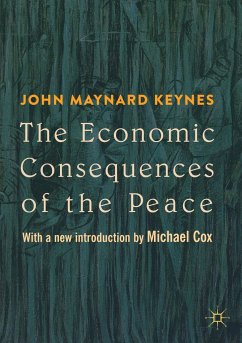
The Economic Consequences of the Peace
Versandkostenfrei!
Versandfertig in 1-2 Wochen
20,99 €
inkl. MwSt.

PAYBACK Punkte
10 °P sammeln!
The Economic Consequences of the Peace was written by the British economist John Maynard Keynes. It was a best-seller throughout the world. It established the general opinion that the treaties were designed to crush the defeated Central Powers, especially Germany and this perception by much of the British public was a factor in later public support for Hitler. The success of the book established Keynes' reputation as a leading economist, especially on the left. When Keynes was a key player in establishing the Bretton Woods system, in 1944, he remembered the lessons from Versailles and the Grea...
The Economic Consequences of the Peace was written by the British economist John Maynard Keynes. It was a best-seller throughout the world. It established the general opinion that the treaties were designed to crush the defeated Central Powers, especially Germany and this perception by much of the British public was a factor in later public support for Hitler. The success of the book established Keynes' reputation as a leading economist, especially on the left. When Keynes was a key player in establishing the Bretton Woods system, in 1944, he remembered the lessons from Versailles and the Great Depression. The Marshall Plan, promulgated to rebuild Europe after the Second World War, was similar to the system proposed by Keynes in this book.












